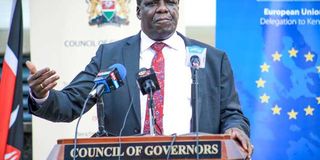Breaking News: At least 10 feared to have drowned in Makueni river
Covid-19: Counties spend Sh11bn to boost preparedness levels

Kakamega Governor Wycliffe Oparanya. PHOTO | FILE | NATION MEDIA GROUP
What you need to know:
- Last Friday, the 47 counties received a further Sh6 billion from the Kenya Devolution Support Programme.
- In April, the UN committed Sh310 million to the national government to be channelled to the counties towards rapid response measures to mitigate the impact and spread of the virus.
From purchasing isolation beds and ventilators, to training healthcare workers, and acquiring personal protective equipment, counties have gone on a spending spree, utilising the Sh11 billion conditional Covid-19 grant from the Health ministry and other development partners to up their level of preparedness.
In May, the counties received the first batch of Sh5 billion from the National Treasury, as a conditional grant after Parliament failed to factor it into the supplementary budget.
Using the revenue allocation formula, Nairobi County was to receive the lion’s share of the funds at Sh294.3 million with Lamu receiving the least — Sh13.6 million. Last Friday, the 47 counties received a further Sh6 billion from the Kenya Devolution Support Programme (KDSP).
SH4.6 BILLION
This comes barely two weeks after the governors, asked the national government to release Sh4.6 billion under the KDSP by the World Bank to be used to fight Covid-19.
Outside of these support programmes, counties have also received funding and support from the European Union, the US, and other international partners.
In April, the UN committed Sh310 million to the national government to be channelled to the counties towards rapid response measures to mitigate the impact and spread of the virus by increasing capacity of the healthcare system, building resilience of vulnerable populations, social protection, and advocating for the rights of women.
Council of Governors Chairman Wycliffe Oparanya has asked his colleagues to closely monitor how the money is spent in fighting the spread of the pandemic and cushion communities from Covid-19 during the tough economic times.
“The governors should now ensure that these funds released to the devolved units for setting up of the 300-bed capacity emergency isolation wards in hospitals is properly managed,” Mr Oparanya said.
“Counties received the money on Friday last week and as governors, our role will be to ensure the full impact of the support from the national government is felt for the next three months.”
ISOLATION CENTRES
Most of the counties have used these funds to prop up their isolation centres, and training of healthcare workers as they upped their level of preparedness.
In his status briefing a fortnight ago, Mr Oparanya said over 30 counties have this week trained 689 healthcare workers and sensitised 1,614 community health volunteers on management of Covid-19 through the support of various partners.
The counties have also used part of the funds to buy isolation beds, with others, like Kakamega, Isiolo, and Uasin Gishu, which have collaborated with the Kenya Medical Research Institute-funded testing labs, opting to buy reagents to hasten testing.
“We still have counties grappling with challenges in procuring the reagents, limiting the capacity of the devolved units to respond to the surge in the number of infections,” Isiolo Governor Mohamed Kuti, who is also the Council of Governors Health Committee chairman, said
Kwale Governor Salim Mvurya said they have already procured 340 beds that will be distributed to public health facilities in the county.
200 BEDS
He added that by Monday, the county will also receive 200 more beds to strengthen its capacity in the fight against the virus.
Counties have also used part of these funds to buy Personal Protective Equipment for health facilities and workers, and the deployment of experienced medical personnel to county hospitals.
Some county governments complained of shortage of water treatment chemicals, which, they said, was affecting provision of clean and safe water to communities in the regions.
“Counties are still in dire need of water treatment chemicals, hence posing a challenge to the provision of clean and safe water supply.
“We’re aware of plans by the Ministry of Water to procure chemicals for the 88 regulated water service providers, and we wish to urge them to expedite the process to meet the rising demand,” Mr Oparanya said.





